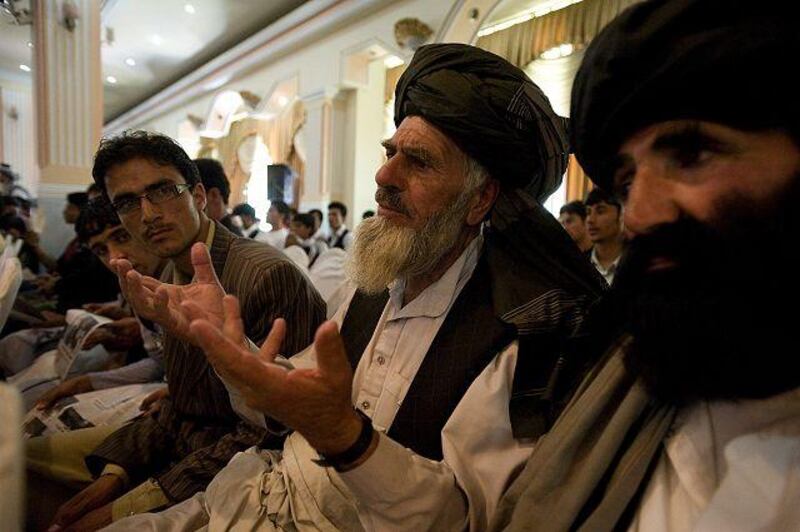KABUL // Afghanistan's electoral campaign season is well underway, with supporters of the main opposition candidate for the presidency holding a series of rallies across Kabul. In the face of a growing Taliban-led rebellion that has spread to once-peaceful areas, the vote on Aug 20 is being seen as a key step towards stabilising the country.
The biggest challenger to the incumbent, Hamid Karzai, looks like it might be Abdullah Abdullah, his foreign minister until 2006 and a prominent member of the old Northern Alliance movement. Rallies have been held throughout the city during recent days in an effort to drum up support for a man considered second favourite. They were often characterised by criticisms of the foreign occupation. Speakers attacked Mr Karzai for being too close to Washington and failing to stop US air strikes from killing civilians. At one meeting, Mr Karzai's friendly relationship with George W Bush was compared unfavourably to the response of an Iraqi journalist who threw shoes at the former US president. Laughter and applause ensued.
Afghans attending the rallies have called on Mr Abdullah to have a more independent approach if he is elected. Gul Baheid, a tribal elder from the eastern province of Paktia, said: "The first time the whole of Afghanistan voted for Karzai because they thought he was a mujahid and would work for the country. But instead he stole all our money and has just worked for the foreigners." A total of 44 candidates are registered to stand in the presidential election, although a vetting process may whittle that further. After months of speculation regarding who will challenge Mr Karzai, many of the biggest names mentioned pulled out before the race had even begun.
They included Gul Agha Shirzai, the governor of Nangarhar province; Ali Ahmad Jalali, a former interior minister and Zalmay Khalilzad, who served as US ambassador to Afghanistan during the Bush administration. That has arguably left Mr Abdullah as Mr Karzai's main rival. He enjoys the backing of a major opposition block made up of some of the country's most notorious warlords and his supporters regard him as a figure who can unite Afghanistan's different ethnic groups. However, his friendship with Ahmad Shah Massoud, the late mujahideen commander of the Northern Alliance, may ultimately alienate more people than it attracts.
Candidates have so far been reluctant to outline their policies, which means their personalities and connections are all that voters have to go on. Bashir Banish Hanifi, 22, a student from the northern province of Badakhshan, described Mr Abdullah as "a jihadi" who could help bring peace and reduce nationwide unemployment. He added that the occupation should end, a demand none of the principal contenders are likely to agree with yet.
"My opinion is that we want the man we support to have his hands free. If the foreigners leave the country and let the government work alone, that will be better. A lot of people believe the foreigners are trying to make the situation worse," he said. The 2004 presidential elections were also supposed to be a significant step forward from the bloodshed of the past. Mr Karzai won 55.4 per cent of the vote, while his nearest rival finished with just 16.3 per cent.
But security deteriorated significantly across much of Afghanistan in subsequent years and, having been written off as a spent force last time around, the Taliban are now engaged in an insurgency that has reached the outskirts of Kabul. Anger towards the international community is greater than at any point since the 2001 invasion and, one way or the other, it seems certain to play an important part in what happens this summer.
Rumours persist that the election is a formality because Washington favours Mr Karzai and will fix the result. Reports that Mr Khalilzad will have some kind of role in any future administration have fuelled these suspicions. "We heard that Mr Karzai went to America and had a meeting with [Barack Obama] who told him: 'If you want another man to have power under you we can send somebody.' Mr Karzai didn't accept the first time, but when he came back to Afghanistan he changed his mind. That's why Mr Khalilzad and Mr Jalali did not stand for election," Mr Hanifi surmised.
Of more concern for Afghans across the south and east, however, is the danger they will face just from opting to vote. The Taliban have denounced the elections and refused to take part, leading to fears that they will attempt to derail the process. Meanwhile, civilians are increasingly finding themselves caught up in fighting between insurgents and foreign troops. Haji Ghazi Zadran, another elder from Paktia, had yet to decide whether he was going to support Mr Abdullah.
"There is no security," he said. "It is impossible to hold a free election." csands@thenational.ae





